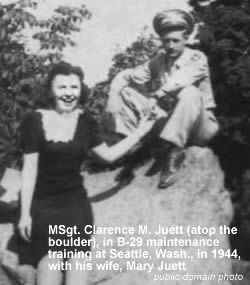Clarence M. Juett (Whitey)
Giltner, NE
1939-40, 2757, Narrows (Blue Bell), SP-3, Ass't Leader
The Civilian Conservation Corps was one of the best things that ever happened to me, my mother, two sisters, and brother. It made it possible for me to support them for 2 years through a very difficult time of our lives (during the depression). My father died in 1927. Being the eldest it was my responsibility to carry on. After graduation from high school at Giltner, NE in 1937 and no prospects of a job sufficient to support the family, I joined the CCC in January 1939.
I was blessed with being assigned to one of the best camps in the country; also one of the most scenic with a staff of really fine supervisors. In my opinion, the men who supervised our various work crews were the best. They were firm, knowledgeable and the type that young men needed at our age to get a good grasp on what life and earning a living was all about.
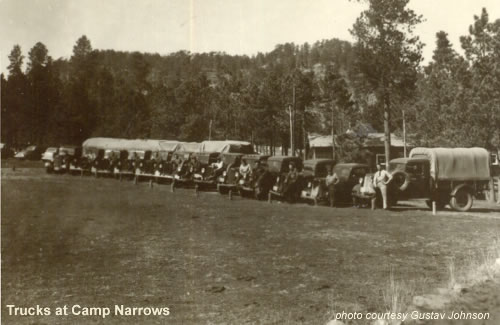
I was assigned to Company 2757, located at Camp Narrows near Blue Bell in Custer State Park. I was born and grew up on a farm on the plains of Nebraska, so it was a very wonderful experience to be in such a scenic place.
In such a place one had the opportunity to work at many different types of work--saw milling, road construction, bridge building, stone quarrying, hi-line erection, forestry maintenance, truck driving, track tractor operation (cat skinning), garage work, to name a few. Then after work we had the opportunity to take classes in woodworking, photography, music, and, classes in basic reading, writing, and arithmetic.
In the beginning, there was the initial rookie indoctrination--snipe hunts, searches for cold steam or striped paint, and other errands--that new enrollees might be ordered to do by the senior enrollees. One lad, though, I will never forget. He was taken on a snipe hunt and left, but came home with what he considered to be a real live snipe. It was a porcupine and I guess I will never know how he managed that, but he did and I am not sure but what he still to this day thinks he had a snipe.
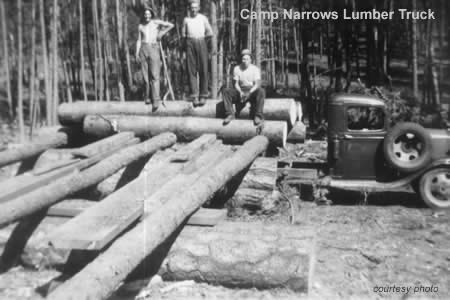
One thing for sure, we learned to keep a clean barracks. We scrubbed and cleaned them so much that eventually they had to replace the wooden sill under the buildings. We had used so much water and soap scrubbing the floors that they rotted. (It was sure good training for the Army Air Corps that I joined later too.)
I spent many weekends climbing in the hills around camp. It was the greatest fun and experience for me, a person born and raised on the plains of Nebraska. Mount Rushmore was an exciting climb too. After a climb to the top and back of Washington's head, the walk back down wore me out, but what an experience to remember.
I was first assigned to the sawmill under the able supervision of Vin Judd where I got a real workout and education in the production of lumber. I sorted, stacked, edged, cut graded, and made shingles, flooring and other milling on the planer.
I fired and operated the steam engine that provided the main power. The steam engine was an old case 1 cylinder steam tractor that had been built into the mill. It could be a bit cantankerous at times too. It seemed as though I was all too often faced with a demand for lots of power when short on steam pressure or having to shut down for one reason or another and then be faced with a full fire pot and full steam pressure. Sometimes the cold water injector wouldn't work when such a condition existed. It needed cold water to knock down the head of steam. I would have to frantically pull the fire. We fired it with wood slabs from the milling operation.
I will never forget one shut down - I heard a scream and saw the cutoff saw operator running up toward the main saw. He had gotten his mitten caught in the cutoff saw and sawed his hand nearly off. I think that was the fastest I ever shut down. As I look back on this operation with inexperienced young people from the farm and cities, I think we did very well in that this was the most serious accident during the time I spent at the mill.
I had another occasion for quite a scare with the same crew, when I was assistant leader. During the fire season we were working a rock quarry operation in which we used a small Cat (tractor) to pull loads of rock to the loading area. The tractor was parked on a steep hill above a big dropoff, with brakes on and engine running. One of the fellows who knew nothing about tractors got up on it and accidentally released the brake. Instead of resetting the brakes, he panicked and jumped off. The tractor started rolling down the hill toward the dropoff. I never knew a track tractor could roll so fast!! I was down hill from it and as it rolled by I grabbed the plumbing on the side and swung on board, then gingerly braked it to a stop. I had a lot of nasty thoughts about people that don't know any better than to mess with equipment that they know nothing about, but was tickled pink to save the unit from going over the dropoff.
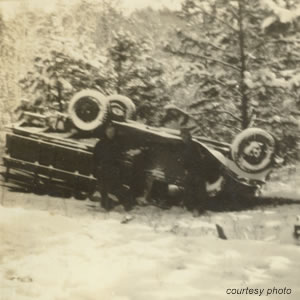
The incident brings to mind another that had happened before I joined the CCC. They had a truck driver called Cold Steam, because in his early days at camp he had been sent to get a bucket of cold steam and he tried his best to find it. One day while hauling in the Mount Coolidge area, he backed a little too far, slipped off the road and rolled his 1935 Ford dump truck over and over down the mountain. He said that he lost control of it the second time over!
When a tourist who happened by asked Perry Van Wie if the driver had been in the truck, Perry answered--"Of course, you don't think we would send a truck on a trip like that without a driver do you ?" I don't know what the tourist thought but we had several laughs about it over the years. In that case, I don't know what the injuries were, but they must have been minor.
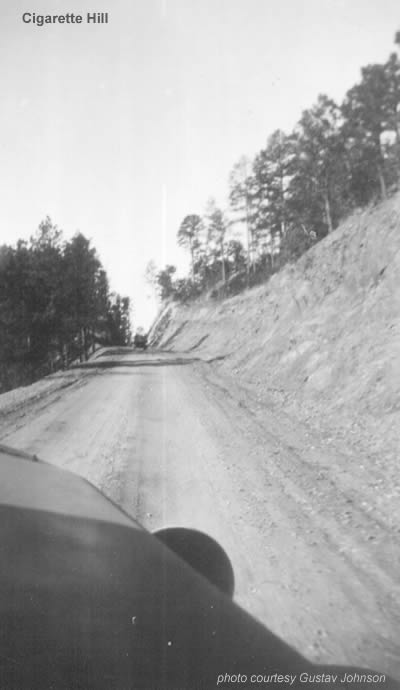
Those 1935 Fords had poor brakes and it is a wonder that we didn't have more trouble than we did. It used to worry me a lot at the quarry when we would haul a load out on a long wheelbase 1935 Ford and head down a steep hill with it in granny (for braking) and the engine would a l most scream while holding it back. I often wondered what might happen if the drive line broke.
There was another hill between camp and town called cigarette hill--you could roll a cigarette at the bottom as we came around the curve and have it smoked by the time you got to the top on account you had to make the pull in granny to make it.
After the saw mill I worked for Perry Van Wie in the camp garage. That was a dream come true--I wanted the experience and he was one of the finest people to work for. I learned to overhaul and maintain trucks; to weld and braze, and a little about painting. The time was all too short and before I knew where it had gone my 2 years were up.
Those years I feel were very important years--such good training and beautiful country. I have no regrets for having spent the 2 years in the CCC. I was able to support Mom and the kids and received such good practical and formal training and experience at the same time. This has been beneficial to me and will be for t he rest of my life.
I wish the present government officials had enough understanding of the great potential that a program like this has. We need someone with the leadership with the management ability, courage, and drive to bring this type of program to those who are being denied the right to be trained to be good hard-working responsible citizens.
P.S. Camp Narrows was in a beautiful setting, with French Creek running by. We had a dam across it making a nice swimming hole and a real thrill was to dive from a board set between the trees--down, down and wowy! What a sensation of "Am I ever going to get stopped and turned back up?!"x
Obituary
REDWOOD CITY, Calif. - Clarence M. Juett, 86, of Redwood City, Calif., died Friday, Feb. 10, 2006, at a rest home.
Memorial services will be at 2 p.m. Feb. 25 at First Congregational Church in Redwood City. Redwood Chapel is in charge of arrangements.
Mr. Juett was born Nov. 1, 1919, at Giltner, Nebraska.
Survivors of the immediate family include his wife, Mary Juett; three sons, Richard, Roger and Dennis Juett; a brother and sister-in-law, Leonard and Helen Juett of Denver.
Additional survivors include grandchildren in Colorado, California and Washington states.
xDerschied, Lyle A. "The Civilian Conservation Corps in South Dakota, 1933-1942." Brookings, SD, South Dakota State University Foundation Press, 1986. No longer in print. Available at some libraries but may not be checked-out.
Do you have additional information about Clarence Juett
We would like to included it. Please write or email us at History "at" SouthDakotaCCC "dot" org.

